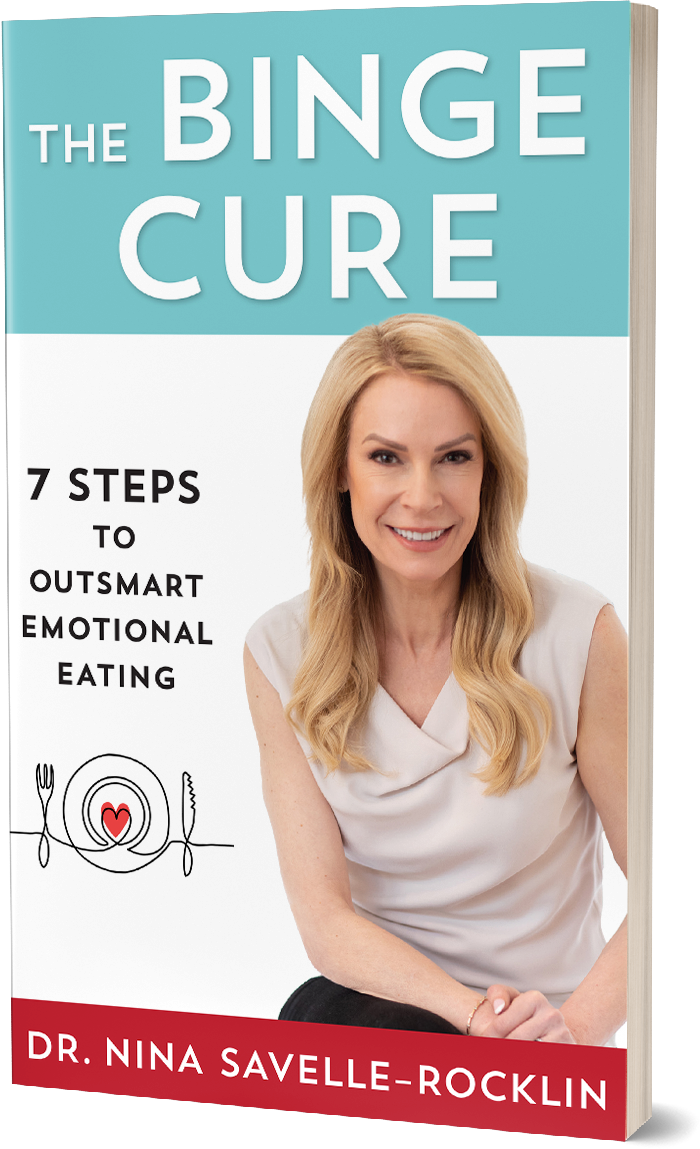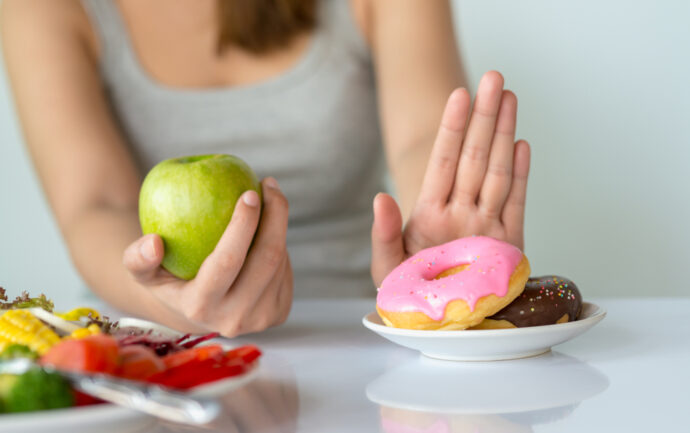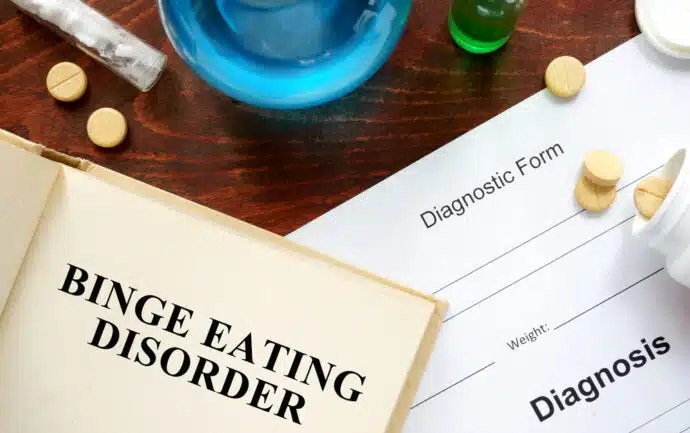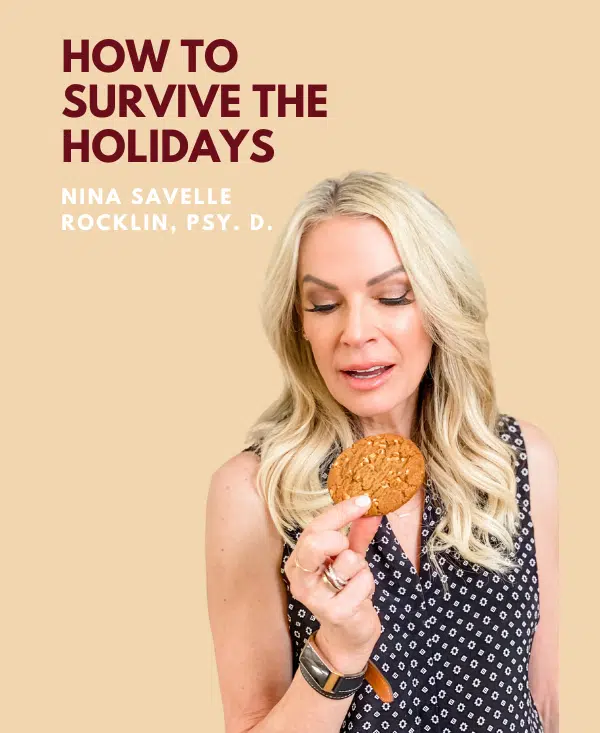Dr. Nina Savelle-Rocklin
How to Break a Sugar Addiction
Table of Contents
- What is “sugar addiction”?
- So if I’m not addicted, why do I crave so much sugar?
- How can I reduce my sugar consumption?
- Get curious about the REAL reason
- Get someone to help you who is trained to help
- To wrap it up
Sugar addiction is a hot topic these days. There are several books that make the case for sugar addiction, portraying sugar as more addictive than heroin. Sugar is EVIL, is the message (okay, slight exaggeration, but only slight). Then, how should we break a sugar addiction.
First, here’s the thing: there’s no such thing as sugar addiction. We actually cannot become physically addicted to sugar the way we can be addicted to alcohol or drugs.
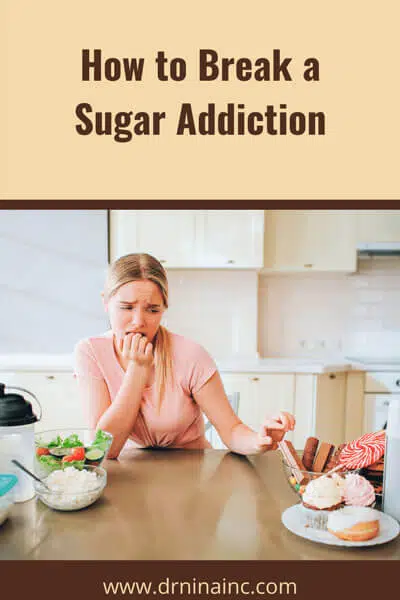
What is “sugar addiction”?
The traditional meaning of “addiction” is the compulsive use of a substance known to the user as harmful. Usually, the more people use it, the more they require to experience the same “high.” When they stop using the substance, they experience withdrawal symptoms.
Building a tolerance applies only to certain drugs that produce physical dependence. There is no such thing as building a tolerance to food. Your brain doesn’t require more and more of it (even though it may SEEM like it does. Even so, it can be hard for someone who feels addicted to sugary foods to listen to what science has to say.
So if I’m not addicted, why do I crave so much sugar?
If we aren’t addicted to sugar, why do we crave it? Some studies suggest that certain types of foods are associated with increased dopamine levels. Dopamine is a neurotransmitter. It’s basically the feel-good chemical in our brains. It allows us to feel pleasure and acts a bit like a reward.
The theory is that sugar activates the release of dopamine in the brain. People eat something sugary and receive a dopamine rush. They feel good, so they want more of that feeling. Sugar gave them that feeling the last time, so they go back to it again.
Yet many things can trigger a dopamine release. Video games, cell phones, sex, working out, conversations with friends, and even psychotherapy and listening to music all trigger dopamine release.
We aren’t actually addicted to any of them. We are just searching for a momentary boost or feel-good hit that dopamine gives us and craving a sense of wellbeing. So how can we reduce the feeling of a need for sugar?
How can I reduce my sugar consumption?
First of all, don’t try to eliminate sugar. Eliminating any food from your diet usually just has the end result of making you want more of the “forbidden food.” It’s going to get in the way of real progress because we want what we cannot have. The moment you start depriving yourself of sugar, or anything else, you’ll start craving more of it.
Also, keep in mind that we have brains, but we also have minds. The brain is the organ that controls our body, but our mind is what allows us to think and reason. Use that to investigate and understand the reasons behind an “addiction to sugar” and take compassionate action. You will see your need for sugar dwindling.
The feeling of being “addicted” to sugar feels physical, but it’s actually psychological. If you have sudden cravings for sugar, there is always a reason, and that reason lies more in your mind than in your brain.
Get curious about the REAL reason
To reclaim your power over sugar, you need to take a look at what’s going on inside of your head and your heart. Your mind is looking for a way to feel better when you suddenly crave sugar. Use that as a cue to yourself to get curious. Ask yourself:
What’s going on in my life?
How am I feeling right now?
What am I missing in my life?
Am I using sugar as a replacement for fun?
Consider what might be causing you to turn to sugary foods. You will start to recognize some patterns. Perhaps you eat for comfort, for distraction, or to reward yourself. Instead, look for new ways to support yourself or soothe yourself instead of using sugar. That can be as simple as journaling your feelings and talking them out on paper.
I love journaling because you aren’t dependent on anyone else to be there for you. If you have someone that you can talk to, that’s great. Many of us don’t have someone available to us or there when we have the most need for them.
Remember to stay patient and to be kind to yourself. It takes time to change, and change happens more quickly when you take your own side.
Get someone to help you who is trained to help
Friends and family are great sounding boards and can be helpful, but they may be unequipped to really help you look for real answers to why you can’t stop eating sugary foods. Seek out someone who is trained to look at the situation from a different perspective, who knows how to help you gain clarity on your triggers.
To wrap it up
There is no how to break a sugar addiction. Remember that you aren’t really addicted to sugar. You are using sugar as a tool to soothe feelings, reward yourself, or result from deprivation.
Also, I don’t like to use the word “addiction,” but it can help to think of it more as an “eating” addiction, a habitual response of using food to soothe, cope, reward, and distract. We may feel addicted, but that’s not the same as being actually addicted to the substance of sugar.
One way that you can get support is by reaching out to a community of people who understand what you might be experiencing. I have a free Facebook group that is very supportive and understanding. Feel free to join us.
Ready to transform your relationship with food?
Join Dr. Nina's newsletter and receive:
• Expert tips on overcoming emotional eating
• Strategies for sustainable weight loss
• Exclusive content not found anywhere else
Don't miss out on the latest breakthroughs in binge eating!
The Author

Dr. Nina Savelle-Rocklin is a renowned author and podcast host and one of the nation’s leading psychoanalysts known for the psychology of eating. Her signature message of, “It’s not what you’re eating, it’s what’s eating ‘at’ you” has resonated with hundreds of thousands of listeners from around the globe in 40 countries. As founder of The Binge Cure Method, she guides emotional eaters to create lasting food freedom so they can take back control of their lives and feel good in their bodies.
Related Blogs

